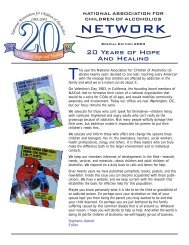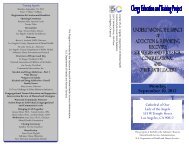Contents - NACoA
Contents - NACoA
Contents - NACoA
Create successful ePaper yourself
Turn your PDF publications into a flip-book with our unique Google optimized e-Paper software.
There is strong, scientific evidence that alcoholism tends to run in families.<br />
Children of alcoholics are more at risk for alcoholism and<br />
other drug abuse than children of non-alcoholics.<br />
Children of alcoholics are four times more likely than other children to develop<br />
alcoholism.<br />
Genetic factors play a major role in the development of alcoholism. There is<br />
an expanding base of literature which strongly supports a heritable basis for<br />
alcoholism and a range of family influences that may direct the development of<br />
children of alcoholics.<br />
Children’s perceptions of parental drinking quantity and circumstances appear<br />
to influence their own drinking frequency.<br />
Children’s alcohol expectancies reflect recognition of alcohol-related norms and a<br />
cognizance of parental drinking patterns by a very early age.<br />
Alcohol expectancies appear to be one of the mechanisms explaining the relationship<br />
between paternal alcoholism and heavy drinking among offspring during<br />
college.<br />
Parental alcoholism and other drug dependencies have an impact upon children’s<br />
early learning about alcohol and other drugs.<br />
Family interaction patterns also may influence the child’s risk for alcohol abuse.<br />
It has been found that families with an alcoholic parent displayed more negative<br />
family interaction during problem-solving discussions than in non-alcoholic families.<br />
Almost one-third of any sample of alcoholics has at least one parent who also was,<br />
or is, an alcoholic.<br />
Children of alcoholics are more likely than other children to marry into families in<br />
which alcoholism is prevalent.<br />
Parental alcoholism influences adolescent substance use through several different<br />
pathways, including stress, negative affect, and decreased parental monitoring.<br />
Negative affect and impaired parental monitoring are associated with adolescents’<br />
joining in a peer network that supports drug-use behavior.<br />
After drinking alcohol, sons of alcoholics experience more of the physiological<br />
changes associated with pleasurable effects compared with sons of non-alcoholics,<br />
although only immediately after drinking.<br />
13





